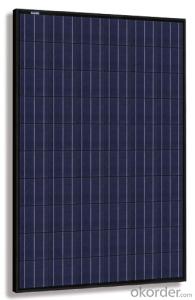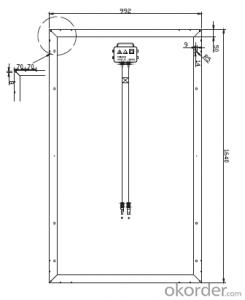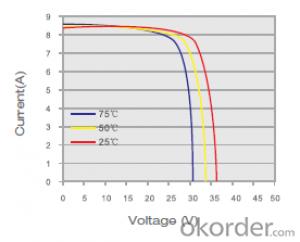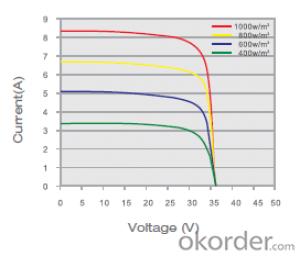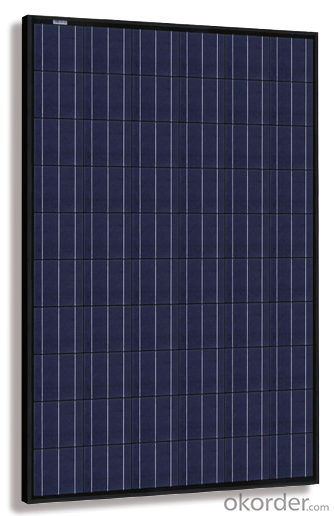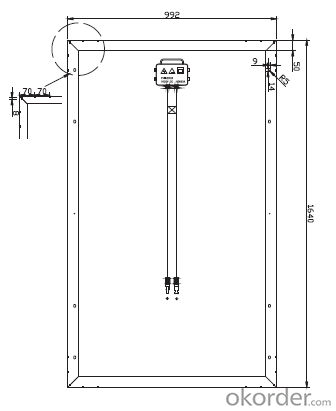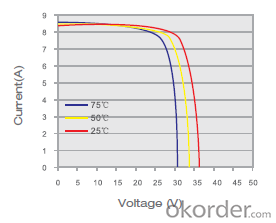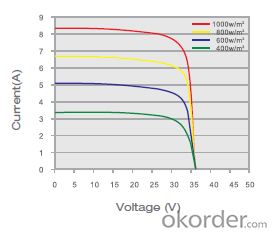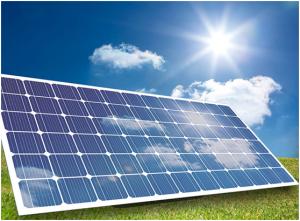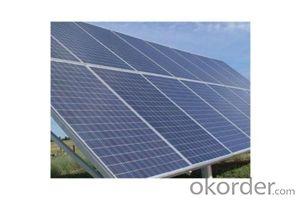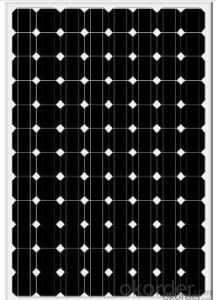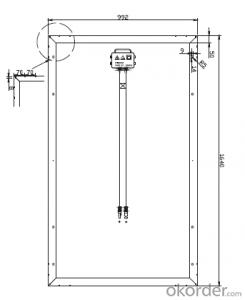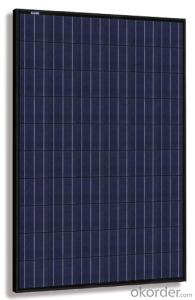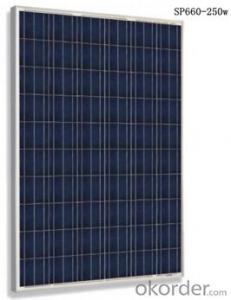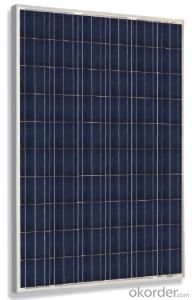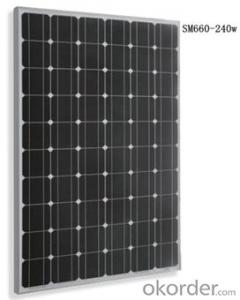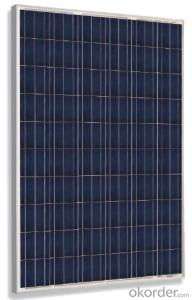Das Solar Panels Polycrystalline Solar Module SP660-240W
- Loading Port:
- Shanghai
- Payment Terms:
- TT OR LC
- Min Order Qty:
- 25 set
- Supply Capability:
- 8000 set/month
OKorder Service Pledge
OKorder Financial Service
You Might Also Like
Product Description:
1.Structure of Polycrystalline Solar Module SP660-240w Series Description:
Polycrystalline Solar Module SP660-240w : High efficiency crystalline solar cell. Even if under the weak light, the solar module can produce maximum power output.
II Tempered glass (toughened glass): Anti-reflecting coating and high transmission rate glass increase the power output and mechanical strength of solar module.
III EVA and TPT: Using high quality EVA and TPT to prevent destroying and water.
IV AI frame: Without screw, rner connection. 6 holes on the frame can be installed easily.
V Junction box: Multi function junction box with water proof.
VI Long lifetime: ≥25 years; Less power decrease.
VII Good performance of preventing from atrocious weather such as wind and hails.
VIII Resisting moisture and etching effectively, not effected by geology.
IX The certificate issued by international authority: TUV, IEC, CE.ISO9001.MCS
2. Standard Test Conditions of Polycrystalline Silicon Solar Panel:
The opto-electrical specifications shown below are stabilized values being measured at Standard Test Conditions, Irradiance: 1000W/m2, Spectrum: AM1.5 at 25°C, The info below is subject to manufacturing tolerances. Where appropriate minutes of measurement are available and are used for the dimensioning of the installation.
Advantages of Polycrystalline Silicon Solar Panel
• 25 year transferrable power output warranty: 10 years / 90%, 25 years / 80%*
• 12 year material and workmanship warranty
• Timeliness of delivery
• Quality Products certified (TUV, IEC, CE.ISO9001.MCS)
3. Characteristics of PolycrystallineSilicon Solar Panel:
• Guaranteed tolerance +3%
• High manufacture standards
• Reliable power output
• High module efficiency
• Module efficiency up to 15.5%
• Cells efficiency up to 17.6%
• Strong compressive strength
• Certified to withstand high wind of 2400Pa
4. Solar Panel Images
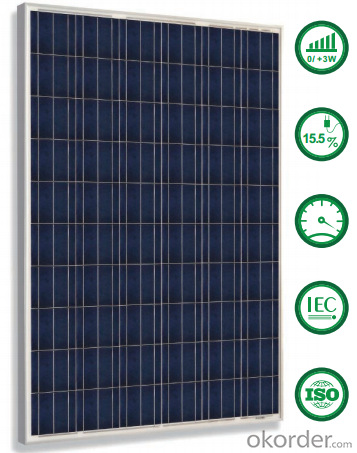
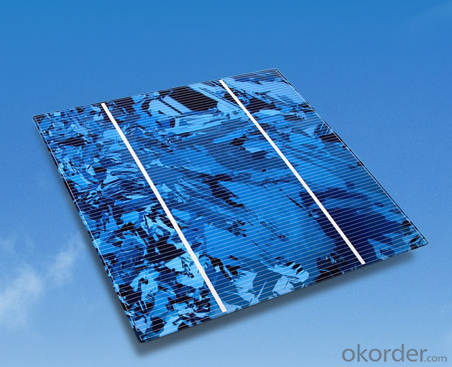


5. Polycrystalline Silicon Solar Panel Specification
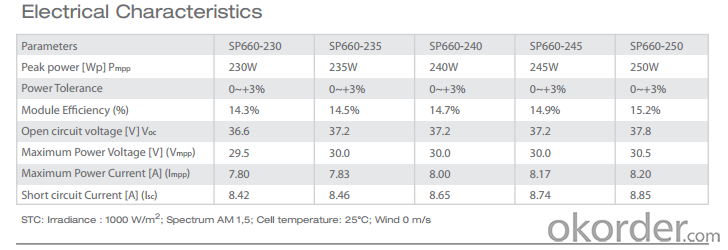
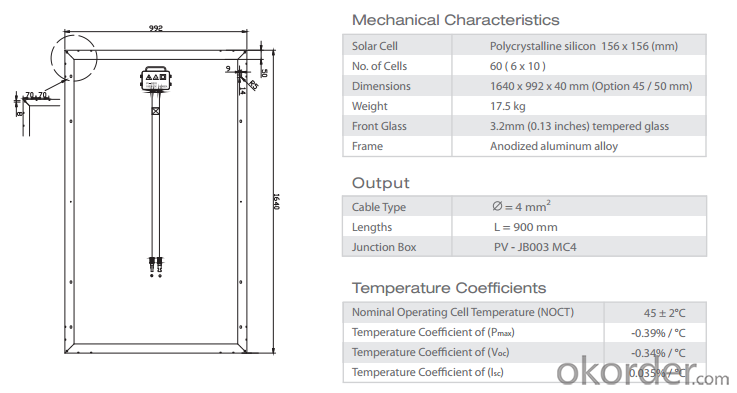


6.FAQ
We have organized several common questions for our clients,may help you sincerely:
①How about your company?
We are a private-owned high-tech company who specializes in developing, manufacturing and marketing of silicon ingots, solar wafer, solar cells, solar modules, PV systems and solar applications products.
At present, We has one research & development team, whose members are well-known experts in photovoltaic area. We also have advanced production and test equipment.
②How to guarantee the quality of the products?
Our products have been certified by CE, CEC,MCS, IEC61215, IEC61730 and ISO9001.
• 25 year transferrable power output warranty: 10 years / 90%, 25 years / 80%*
• 12 year material and workmanship warranty
• Timeliness of delivery
• Quality Products certified (TUV, IEC, CE.ISO9001.MCS)
③How long can we receive the product after purchase?
In the purchase of product within three working days, We will arrange the factory delivery as soon as possible. The pecific time of receiving is related to the state and position of customers.Commonly 7 to 10 working days can be served.
- Q: Can solar panels be used in areas with high levels of wildlife activity?
- Yes, solar panels can be used in areas with high levels of wildlife activity. While it is important to consider the impact on local wildlife, there are measures that can be taken to mitigate any potential negative effects. Proper installation, such as elevation and orientation, can reduce the likelihood of wildlife interference. Additionally, using appropriate barriers or deterrents can help protect the solar panels and prevent damage from animals. Overall, with proper planning and precautions, solar panels can be successfully utilized in areas with high levels of wildlife activity.
- Q: How often do solar panels need to be replaced or repaired roughly? Is it costly to do so?
- New solar panels are clean and shiny and they look cool. Then they get dirty with dust and debris caught on the wind and residues left behind by rain and birds. Solar panels must be regularly cleaned and maintained in order to keep them operating efficiently and maximize the amount of sunlight they convert into electricity. Unlike windows your solar system needs to have a clean and clear surface to ensure they are working at their maximum efficiency. If they are not at their optimum performance it means they are not producing the amount of electricity that they could be. Solar panels will attract dirt, dust, soot, pollen, tree sap and salt crystals in coastal regions creating a fine layer of grime. This layer reduces the amount of light reaching the silicon cells under the glass surface and reduces the panel's effectiveness. A solar panel that has never been cleaned could be producing almost a third less power than it otherwise could be. Some have reported a ten to fifteen percent loss of solar output due to dirty panels. From the ground the panels may appear to be clean, just like your windows. Up close however you can see the grime that has built up from the dirt and pollution in the air. A more noticeable deposit that can be left on panels is bird droppings. These tend to completely block the light from areas of the photovoltaic panel and can considerable reduce its effectiveness. See much more about solar panels maintenance below link
- Q: How do solar panels affect the property's operating costs?
- Solar panels can significantly reduce a property's operating costs by generating clean and renewable electricity. By harnessing sunlight, solar panels can power various appliances and systems, reducing or even eliminating the need to rely on expensive grid electricity. This can lead to substantial savings on utility bills, making solar panels a financially sound investment for property owners.
- Q: what are solar panels?
- A solar panel is a device that collects and converts solar energy into electricity or heat which can be used by (for example) nearby buildings. Solar photovoltaic panels can be made so that the sun's energy excites the atoms in a silicon layer between two protector panels. Electrons from these excited atoms form an electric current, which can be used by external devices. Solar panels were in use over one hundred years ago for water heating in homes. Solar panels can also be made with a specially shaped mirror that concentrates light onto a tube of oil. The oil then heats up, and travels through a vat of water, instantly boiling it. The steam created turns a turbine for power. The basic element of solar panels is pure silicon. When stripped of impurities, silicon makes an ideal neutral platform for transmission of electrons. In silicon’s natural state, it carries four electrons, but has room for eight. Therefore silicon has room for four more electrons. If a silicon atom comes in contact with another silicon atom, each receives the other atom's four electrons. Eight electrons satisfy the atoms' needs, this creates a strong bond, but there is no positive or negative charge. Silicon atoms combine for years to produce a large piece of pure silicon. This material is used on the plates of solar panels. Combining silicon with other elements that have a positive or negative charge can also create solar panels.
- Q: I made three 36 solar cell (3x6 .5V 3.5A) panel and had it hooked a up to an old car inverter. I was on line looking for a cheap grid tied inverter. I came across the Enphase micro inverter and was wondering if i could use one of those. Will it work?
- Solar okorder /
- Q: Can solar panels power my entire home?
- Yes, solar panels can power your entire home. However, the feasibility of this depends on various factors such as the size of your home, the amount of sunlight available in your area, the efficiency and capacity of the solar panels, and your energy consumption patterns. It is recommended to consult with a professional to assess your specific needs and design a solar system that can meet the energy requirements of your entire home.
- Q: Can solar panels be installed on military bases or installations?
- Yes, solar panels can be installed on military bases or installations. In fact, many military bases around the world have already adopted solar energy as a means of reducing their reliance on traditional fossil fuels and increasing their energy security. Solar panels provide a sustainable and cost-effective source of electricity, which aligns with the military's efforts to improve environmental sustainability and operational efficiency. Additionally, solar installations on military bases can enhance energy resilience and readiness by reducing vulnerability to power outages and disruptions.
- Q: Can solar panels be installed on agricultural or farming operations?
- Yes, solar panels can be installed on agricultural or farming operations. In fact, they are increasingly being adopted in these settings to generate clean and renewable energy. Solar panels can be installed on rooftops of barns, sheds, or other structures, as well as on open fields or unused land. By harnessing solar energy, farmers can reduce their electricity costs, lower their carbon footprint, and contribute to a more sustainable farming practice. Additionally, solar panels can provide shading for livestock or crops, minimizing heat stress and improving overall farm productivity.
- Q: Can solar panels be used in agriculture?
- Yes, solar panels can be used in agriculture. They can provide clean and renewable energy to power various agricultural processes such as irrigation systems, livestock operations, and crop drying. Additionally, solar panels can be installed on farm buildings or in open fields, helping farmers reduce their reliance on traditional energy sources and lower their carbon footprint.
- Q: How do solar panels affect the overall carbon footprint of a building?
- Solar panels can significantly reduce the overall carbon footprint of a building. By harnessing the power of the sun to generate electricity, solar panels reduce the reliance on fossil fuels for energy production. This means that less greenhouse gases, such as carbon dioxide, are released into the atmosphere during the building's operation. Consequently, solar panels contribute to a cleaner and more sustainable energy system, helping to mitigate climate change and reduce the building's environmental impact.
Send your message to us
Das Solar Panels Polycrystalline Solar Module SP660-240W
- Loading Port:
- Shanghai
- Payment Terms:
- TT OR LC
- Min Order Qty:
- 25 set
- Supply Capability:
- 8000 set/month
OKorder Service Pledge
OKorder Financial Service
Similar products
Hot products
Hot Searches
Related keywords
